OPINIONS
OPINIONS
Andys Loizou*
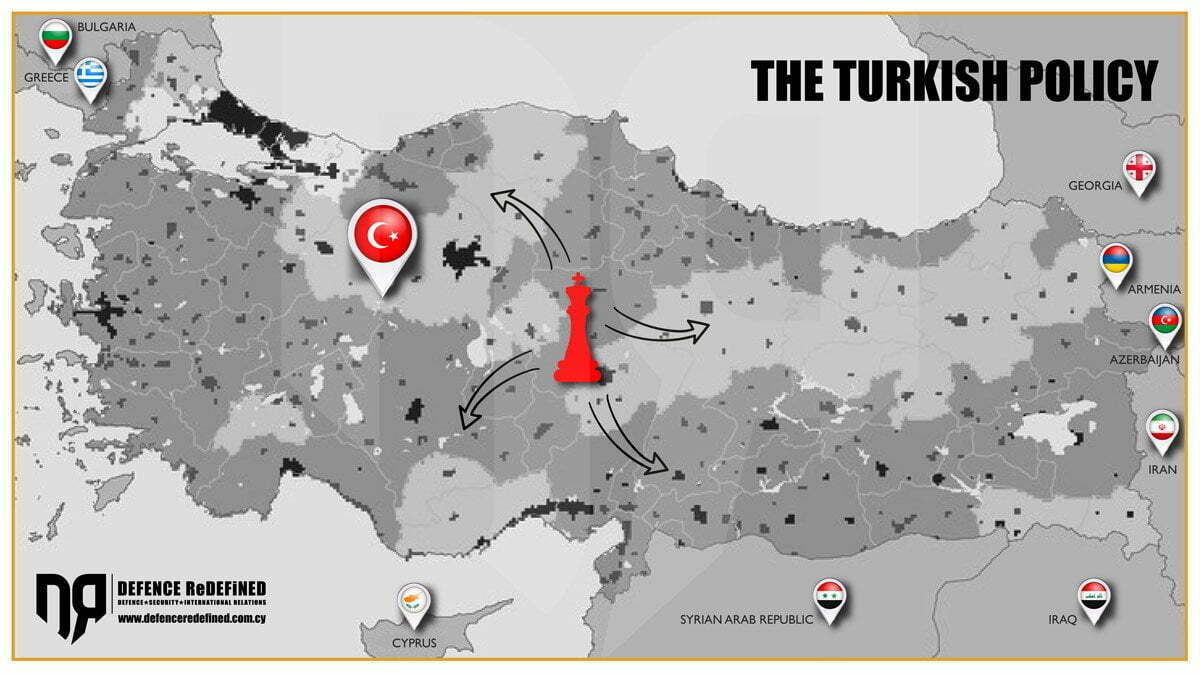
The Turkish policy of the Blue Homeland is another threat against Greece and Cyprus and a continuation of Turkey’s strategy to achieve its goal of reviving the Ottoman Empire and becoming a regional leader, as mentioned in Ahmet Davutoglu’s book, “Strategic Depth”. This book best presents the Turkish strategy pursued over time (before 1980) in order for the country to become a regional power and then a regional leader as well as to determine the policy of the states of its region.
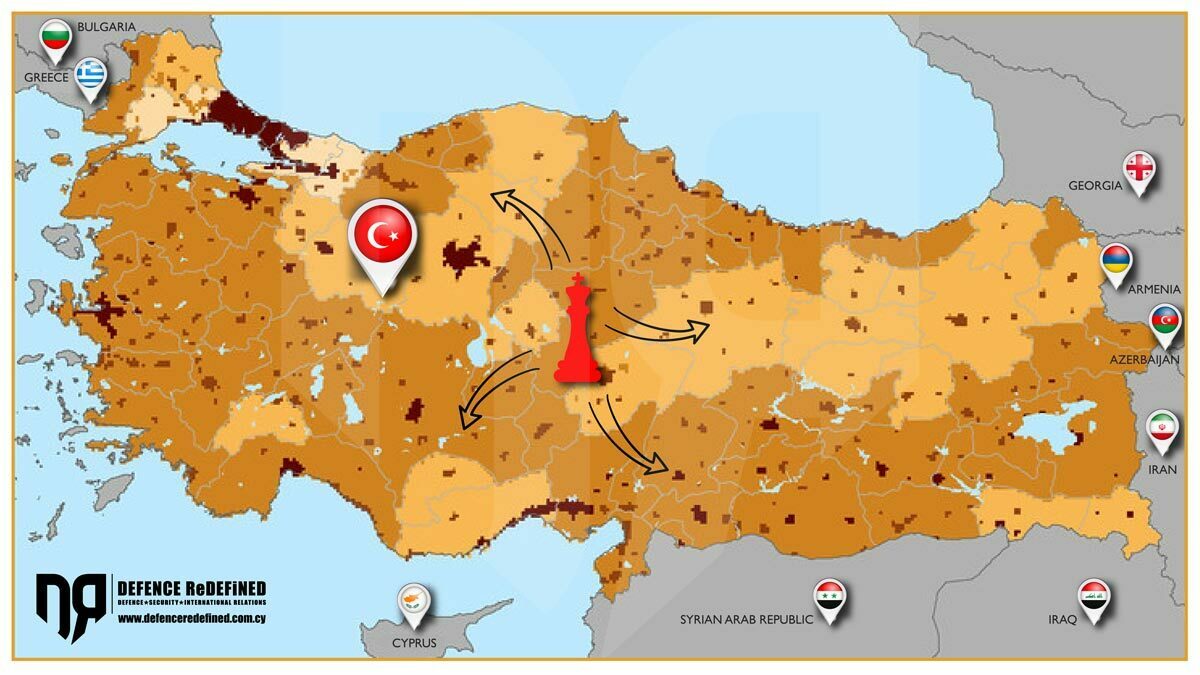
Turkish Expansion Policy
Analyzing the geography of the wider region from the eight countries sharing borders with Turkey, only Iran is stronger in military power according to the balance of military power. Turkey’s relations with Iran are neither stable nor the best, although occasionally their common interests present their relationship as harmonious.
With the regional states, there is a tug of war between Turkey and Egypt, which is the “leader” of the Arab world and which Turkey wants to replace. The same applies to Albania and North Macedonia where Turkey has military bases (as well as a Naval Base in Albania). The excellent relationship that Erdogan’s Turkey had developed with Egypt during the rule of the Muslim Brotherhood should by no means go unnoticed. The purpose of the bases in Northern Macedonia and Albania is to exert pressure, indirect threat and create concern or even fear in Greece.
At the same time, Turkey has invaded Syria, Iraq and is supporting the recognized Libyan government with military forces and Islamic State terrorists, while maintaining military bases in Djibouti and Qatar. On the other hand, Turkey’s relations with Saudi Arabia and the United Arab Emirates are strained. Turkey’s relations with Russia are volatile and it would not be an exaggeration to say that they are also adventurous. Knowing that it is the most important embankment in Russia and Iran to Europe, the aim of Turkey is to walk the line between Russia on the one hand and the US-Europe on the other, offering the greatest possible benefits, something it is achieving to this day.
Turkey-Greece-Cyprus relations
The continuous questioning of the sovereign rights of Greece and the Republic of Cyprus and the ever-escalating challenges in Cyprus’s Exclusive Economic Zone (EEZ) are self-evident elements of the seriousness of the situation that Cyprus is going through and warn against the escalation of the situation without excluding a war conflict.
The concerns and worries of the Greek-Cypriot people about their security are expressed in various ways and, paradoxically, they expect actions that will cause cost to Turkey to be made by third parties who will resort in case of war so as to protect them. This mentality is the worst, because it fills people with high hopes and unfortunately this mentality is cultivated artfully and deceitfully by the vast majority of political parties in Cyprus.
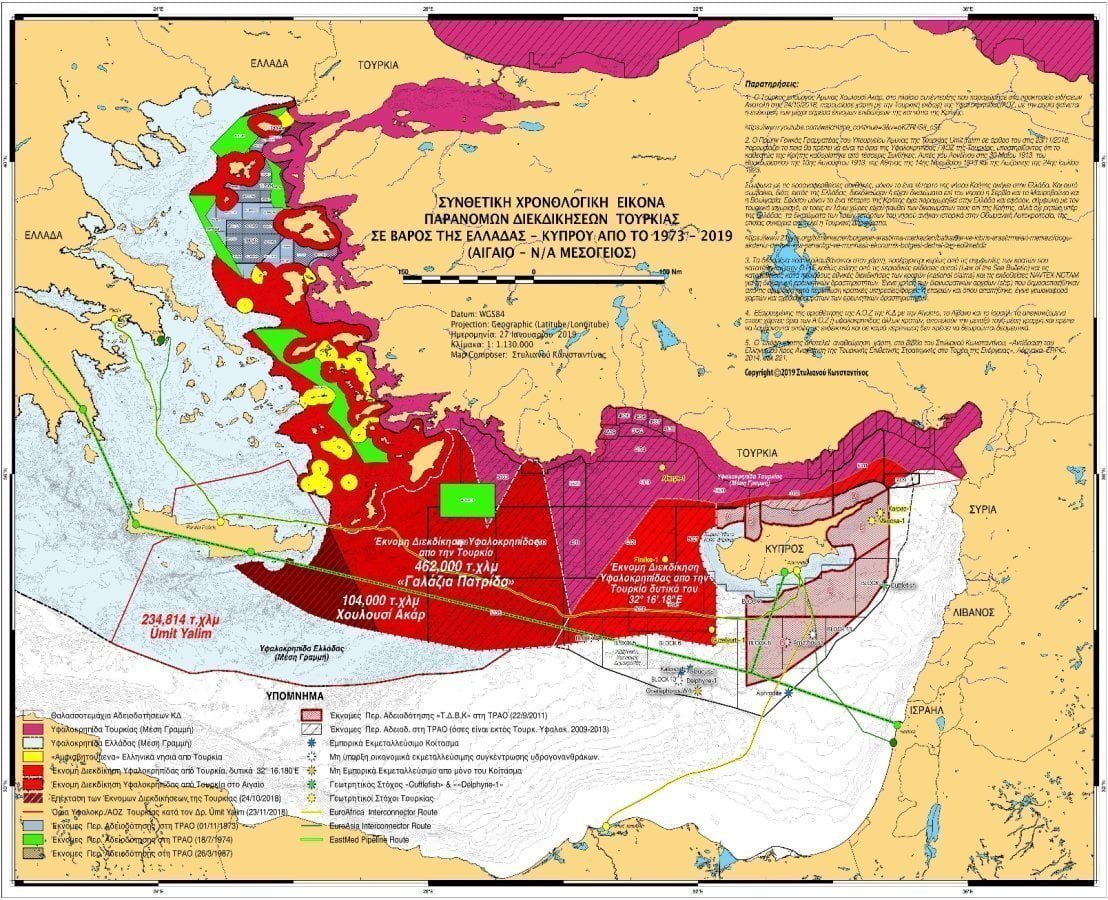
Synthetic Chronological Image of Illegal Claims of Turkey against Greece-Cyprus from 1973-2019 (Aegean-S/E Mediterranean) © Stylianou Konstantinos
Under no circumstances should the methodical and well-designed challenges of the Turkish Occupation Forces be ignored, even within the Buffer Zone, especially in those nearby areas where the National Guard (NG) has been withdrawn and those from which the nearest NG outposts are far away. Such areas where the challenges occur are Strovilia, Denia, Pano Zodia and finally (February 2020) the Paphos Gate where, as is well known, the wider area of the Courts – Ledra Palace – Paphos Gate falls under the 1989 Aggregation Agreement.
The hybrid war waged by Turkey against Greece and Cyprus with illegal immigrants sent from the mainland to the occupied territories of the country and then by sea or on foot crossing through the buffer zone to the Republic’s area of control should not go unnoticed either. In this way a huge political, social and economic problem is created, a problem that is at the same time a fifth phalanx in case of war as surprisingly almost all of the immigrants are Muslims and no one knows how will they act or behave in case of an incident or conflict or what instructions they got from Turkey which sends them. Finally, Cypriot state officials including ministers have admitted that the situation with illegal immigrants is very difficult to manage and financially very expensive.
Unfortunately, on the part of the Greek side (Greece and Cyprus), the treatment of this Turkish expansionist policy is superficial and characterized by phobic syndromes and a lack of political will. A proof of this is the constant appeasing policy of Greece and Cyprus towards Turkey with a parallel downgrading of the Armed Forces, claiming various ridiculous and unsubstantiated excuses. The worst thing for the Greek side is that the Turkish side has fully understood how it reacts and continues to intimidate as much as it can. The actions of Hellenism must cease to be based on the theoretical statements of composure and self-restraint, but they must cause cost in Turkey and present the Turkish expansionist policy with every opportunity.
*Colonel (Ret)
A reluctant alliance? A different approach to French – Serbian defence relations
It has only been a few months since Croatia started receiving the first of the Rafale fighter jets it ordered from France.
The role of SERIOUS GAMES in the development of skills on Defense Standards
In an increasingly complex world, one vital factor for any successful organization is continuous capability building.
Strategy for Building Up Interoperable Defence Capabilities
Based on the current and emerging security threats and challenges in the geostrategic landscape, there is a…
BATTLEFIELD ReDEFiNED 2024 | The premier Defence and Security Conference Successfully Concludes in Cyprus – Photos
The International Defence and Security Conference “BATTLEFIELD ReDEFiNED 2024” was successfully concluded on Friday, 13, December 2024…
Ukraine | Receipt of 1.2 Million Drones in 2024
The Ukrainian Ministry of Defence announced that it had supplied 1.2 million unmanned aerial vehicles to the Ukrainian army in 2024.
Germany | Record Arms Exports to Turkey
German arms exports and defence ties have effectively been on hold since 2016. However, this is now changing due to the complex…
BATTLEFIELD ReDEFiNED 2024 | The Major Defence and Security Conference has Started in Cyprus – Photos
The defence and security conference, BATTLEFIELD ReDEFINED 2024, started today and is taking place in Nicosia…
OPCW | Urgent Meeting on the Syrian Stockpile
The Organisation for the Prohibition of Chemical Weapons (OPCW) will hold an emergency meeting on Thursday to address concerns…
USA | Amendment to the Defence Budget Strengthens Washington-Nicosia Defence Ties
The US National Defence Authorisation Act (NDAA) adds the Republic of Cyprus to the list of countries eligible to participate in…









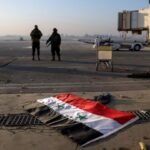




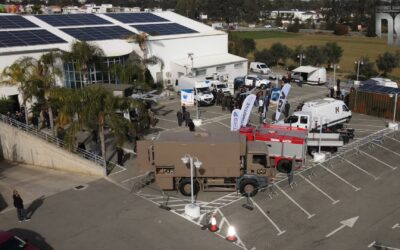



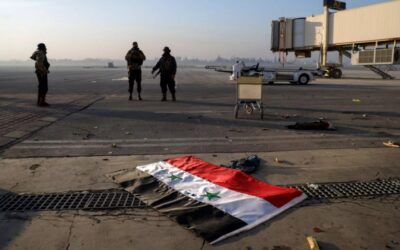

0 Comments